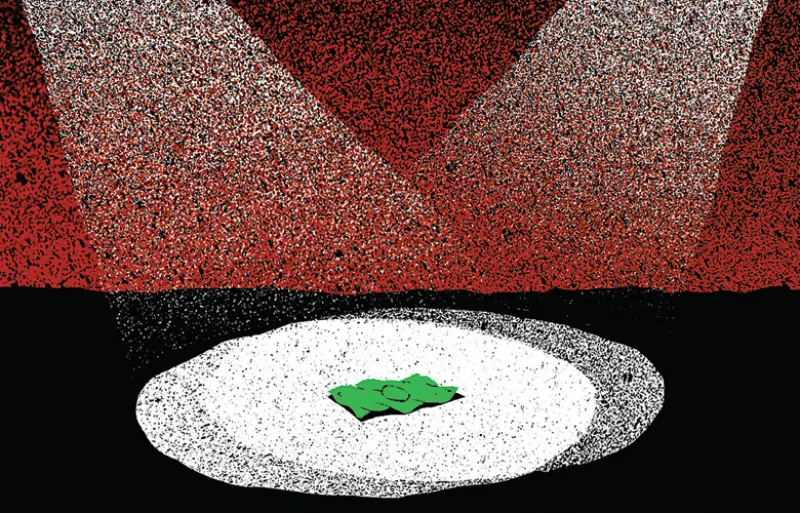Audience members walked into the august Vivian Beaumont Theater at Lincoln Center with high expectations for Junk, Ayad Akhtar’s new play about 1980s Wall Street. Akhtar won the 2013 Pulitzer Prize for Drama for Disgraced, and The New York Times led this fall’s theater season coverage with a profile of the playwright. Savvy theatergoers got the message: Junk was the play to see this fall.
But a spate of recent films and television shows — The Big Short, The Wolf of Wall Street, Billions, and Wall Street: Money Never Sleeps, to name but a few — depict the wheeling and dealing of high-powered finance. The question is, can Junk say something new about the Street and its infamous players like Michael Milken?
Junk is a sprawling play, with more than a dozen speaking characters. It focuses on Robert Merkin (Steven Pasquale, a standout in the musical The Bridges of Madison County), who seemingly will do anything — legal, illegal, or shady — to acquire the family steel business of Thomas Everson (Rick Holmes). It epitomizes the hostile buyouts that Milken perfected before federal regulators nabbed him in 1989 on insider trading charges.
The play is replete with Wall Street characters, including persistent FBI agents, unscrupulous corporate raiders, ambitious financial reporters, and investors trying to play (mostly) by the rules.
Akhtar humanizes Merkin and deepens his character through scenes with his wife, Amy (Miriam Silverman), and their baby. Amy, a savvy insider herself with an MBA, helps her husband dissect a company’s books and offers sagacious advice. The cast also features dogged reporter Judy Chen (Teresa Avia Lim), who falls for old-school financier Leo Tresler (Michael Siberry), decades her senior.
Merkin deceives at every turn. When he tells a major investor that he can have his money back at any point, the audience knows Merkin is lying. Why doesn’t the investor? Why would an investor, however naive, plunge $50 million into a deal without asking for a written agreement?
These are the plot devices that steer Junk into contrivance and phoniness. Reporter Chen is at first repulsed by Tresler when she interviews him and sees through his bluster. Soon after, he sends her red roses and she agrees to dinner, where she is seduced on the spot. Why does she fall for him? Was it the roses? His money? Relinquishing journalistic ethics to sleep with a source is a fraught decision, but Akhtar doesn’t even explore it.
And Everson, owner of the family steel firm, is aghast at Merkin’s braggadocio, swagger, and devious ways. Everson is also an experienced CEO of a public company, and though junk bond strategies were new in the 1980s, one imagines he would have been better prepared to handle and parry the barbarians at the gate.
Yet the play is engaging. Directed by Doug Hughes (Tony Award winner for Doubt and nominee for Frozen), it’s fast-paced, with short, cinematic scenes. The set, designed by John Lee Beatty, is geometric and abstract, befitting the slick tempo of Hughes’s direction.
But Junk’s downfall revolves around characters. Ruthless and unctuous Merkin is caricatured rather than fleshed out. We don’t feel for him, not because he’s so villainous, but because he has no soul, no depth, and no background. Akhtar portrays him as driven by an all-consuming passion for making gobs of money, but that isn’t enough to give him life. Don’t we know much more about Shakespeare’s Macbeth than his ambition?
I’ve interviewed a slew of hedge fund types, and each one has a story to tell, a personal background, idiosyncrasies. Merkin doesn’t.
Akhtar said he was inspired to write Junk by exposés like The Predators’ Ball and Den of Thieves, according to an interview with playwright John Guare (Six Degrees of Separation) published in the Lincoln Center Theater Review.
“I didn’t go to business school, but I had a deep familiarity with the kind of iconic histories that operate as myth within the business world, like the RJR Nabisco deal and the Revlon deal and the titanic figures from that era,” Akhtar told Guare.
And therein lies the rub. Akhtar has read all the right books, done his homework, and is (mostly) on the right side of ethics and integrity. But he hasn’t grasped what it’s like to live a junk bonder’s life, a reporter’s life, or an investor’s life. He’s written an academic exercise, revisiting the 1980s, to show how obsession with money leads to destruction.
Akhtar has given us all the externals of a scheming, unsavory charlatan, without ever delving into his heart.




